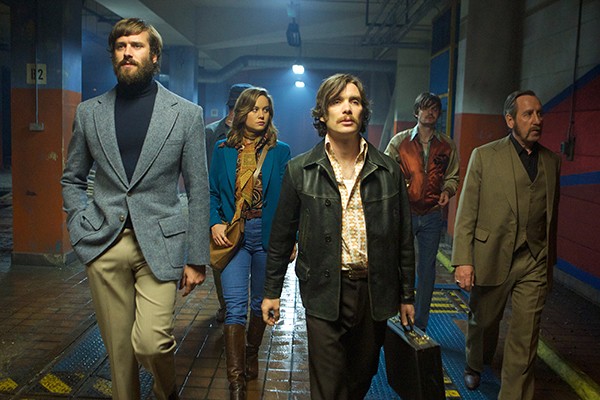The only time I ever fired a gun, I did so at the behest of coworkers on a lunch break. Terrified of holding something that could accidentally kill, I immediately pointed in the direction of the target, fired until it was empty so I could hand it back, and took no joy. Guns are primarily a filmic thing for me. They are how a character declares dominance over another or mastery over the plot. They deliver tragedy, finality, and twists.
Ben Wheatley and Amy Jump’s Free Fire is squarely in the canon of purely cinematic bulletry. In a rundown 1970s American warehouse, gun dealers and IRA members meet to facilitate a sale of M16s. The deal goes bad, and all parties become trapped in the warehouse shooting at each other. They’re character actors (Sharlto Copley, Noah Taylor), at first expressive in outdated slang and hair and then, as everyone is nicked and becomes woozy from loss of blood, through increasingly odd pronouncements. They tease each other across the way, laugh, call timeouts, forget which side they’re on, and generally behave like little kids at play. The gunfight is the entire film. Like other action movies, it doesn’t lead to much more than murder, but Wheatley and Jump’s art-film care is evident. The fun is in how intricately far gone the situation can become. Each person gets pinned down in his own little corner of the warehouse. Geography-wise, we often can’t tell who is aiming at whom, but the lack of clarity adds to the tension. I worried every talking head onscreen would explode.
Free Fire is an improvement over the couple’s previous High-Rise, which also concerned slow entropy toward murder in a ramshackle space. Adapting J.G. Ballard’s novel about a societal collapse occurring only within one 1970s apartment building, they never found a way to make its absurdity more than clinical and detached, full of beautiful images but airless. Here there is mood and momentum, but the visuals are less intricate. The warehouse starts as a color-corrected swath of yellow and black, but as the fight goes on, the colors open up: the red of a van, the brown of Armie Hammer’s scruff, the various liquids and solids that come out of and fall onto everyone.

Hammer’s Ord (probable surname Nance) stands out for his goofy self-regard. As bullets weaken him, he goes from broad-shouldered alpha male to chummy raconteur using a crowbar for a cane. Lounge lizard Vern (Copley) is also memorable, a more insecure showboat. Blood loss leads him to dress in cardboard armor to protect against sepsis, and the various substances that coat him eventually make him look like a gray-headed werewolf. As their arms and legs start failing, I took it as metaphor for old age felling cocks of the walk.
Brie Larson and Cillian Murphy, the prettiest and with the least disagreeable traits, play the nominal audience-identification figures. Wheatley and Jump care about the plot a little in regard to Larson’s femininity versus all the boys, who forego shooting at her for a while out of gentlemanly courtesy. But the bro-hood that develops among the shooters, the sense of comradeship and childlike play, is the film’s best note.
Free Fire is more successful than the recent Belko Experiment, which used a Battle Royale template to satirize the workplace and rang hollow. Here we have Reservoir Dogs crossed with the comedic fights from Pineapple Express. What the tone does is undermine action like the lionized shootout in Heat, where the accurate, deafening gunfire sounds and military precision of the bank robbers subconsciously celebrate their form and machismo. Free Fire brings to mind a nice moment in The Assassination of Jesse James, when an 1800s gun behaves accurately for the period and misfires, costing its owner his life.
Cinema is love of image, and a man with a gun is a conductor with a baton, calling the world to his will. It is important to be able to call him a buffoon. The men dying in this fictional warehouse are venal, squabbling, and manic. Their anthem is an ironic John Denver eight-track left playing in a van. There is nothing ennobling about their violence. But there is humanity in the mistakes that bump them off, and black comedy in the stupid, small ways life can drain from us all.